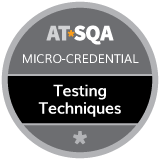AT*SQA Micro-Credentials - Testing Techniques

Testing Techniques Micro-Credential
Testing techniques are procedures that are used to identify and select test conditions that can be targeted by tests. This micro-credential helps you prove you have an understanding of testing techniques, and how they can be applied at any stage in the development of software. The earlier testing starts (i.e., the shift left), the more effective and efficient the testing is. In the world of rapid lifecycles and continuous integration and deployment, testing is a critical task that must be executed to ensure that quality is being built into a product.
Learn Testing Techniques through AT*Learn Training
Testing Techniques in Software Development: What QA Teams Need to Know
Testing techniques are often classified into three broad categories: Manual Testing Techniques, Automated Testing Techniques, and Specialized Testing Techniques.
AT*SQA's free Testing Techniques body of knowledge and optional AT*Learn training webinar give QA teams basic knowledge about testing techniques. Below are key points from the body of knowledge and webinar.
Manual Testing Techniques form the backbone of software testing, with a particular emphasis on understanding the software testing lifecycle, problem-solving skills, and test case design and implementation. The primary techniques within this category include:
- Black-Box Testing: This technique tests the functionality of the software without looking at internal code structure, hence the term "black box". The focus is on input and output, without any knowledge of the software's internal workings.
- White-Box Testing: Also known as clear, glass box, or structural testing, this technique involves testing the internal structure, design, and coding of the software. The tester has knowledge of the internal workings of the software.
- Gray-Box Testing: This testing technique is a blend of both black-box and white-box testing. While the tester may not have full knowledge of the internal workings of the software, they have access to design documents and the database.
Automated Testing Techniques involve the use of various automation tools and focus on script creation, test management, and the integration of testing into the software development life cycle. Key tools used in automated testing include Selenium, JUnit, and TestNG, among others.
Specialized Testing Techniques cater to niche areas of testing. The primary ones highlighted include:
- Performance Testing: This technique tests a software program's speed, stability, and responsiveness under a particular workload. It helps to identify bottlenecks and high load issues in the software system.
- Security Testing: This technique is used to identify vulnerabilities and threats in a software system. The goal is to find all possible loopholes and weaknesses where a potential attacker could penetrate the system.
Each of these testing techniques carries its own unique learning outcomes and collectively, they form a comprehensive suite of skills required in software testing. In the fast-changing profession of software development, a thorough understanding of these testing techniques is crucial to ensure the delivery of high-quality software products.
AT*SQA's free body of knowledge provides helpful insights into the different methods, benefits, and potential risks involved in testing techniques. For those who prefer to watch a presentation on Testing Techniques, AT*SQA also offers the $7.99 per month AT*Learn software testing training area.
After you have learned about testing techniques, prove your knowledge with the Testing Techniques micro-credential. Like all of AT*SQA's micro-credentials, upon passing, the micro-credential will appear on your profile in the Official U.S. List of Certified & Credentialed Software Testers™ and give you points toward your Testing Tiers® software tester ranking level.
AT*SQA Software Testing Micro-Credentials
Agile Testing Certification AT*SkillStack™
Consists of the following AT*SQA Micro-Credentials:
API Testing Certification AT*SkillStack™
Consists of the following AT*SQA Micro-Credentials:
Test Automation Certification AT*SkillStack™
Consists of the following AT*SQA Micro-Credentials:
Testing Essentials Certification AT*SkillStack™
Consists of the following AT*SQA Micro-Credentials:
Other Micro-Credentials
Testing Using The Cloud